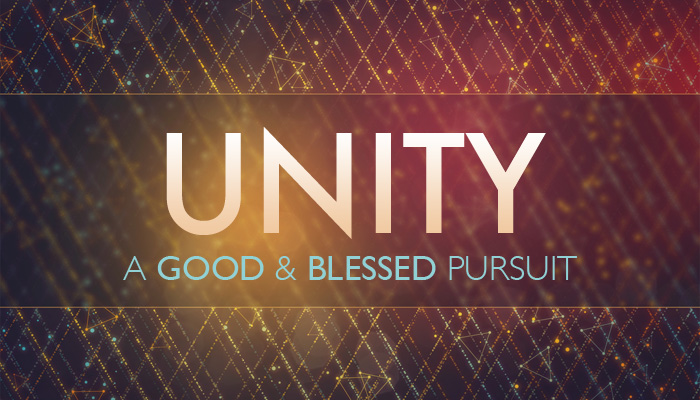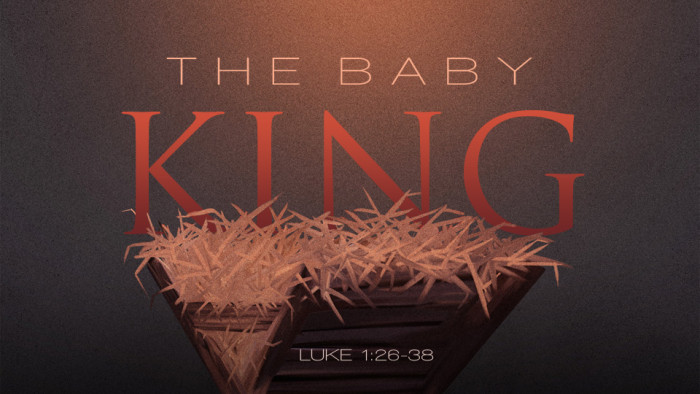“A minister may fill his pews, his communion roll, the mouths of the public, but what that minister is on his knees in secret before God Almighty, that he is and no more.” – John Owen
Sermon of the Year
I don’t get a chance to listen to many sermons outside of those preached by other brothers at Imago Dei. Thus, my sample size for a “Favorite Sermon of the Year” is quite small.
Even if I had listened to dozens – maybe hundreds – more sermons I’m convinced none would have moved me like John Piper’s “Persuading, Pleading and Predestination: Human Means in the Miracle of Conversion.”
This was my favorite sermon of the year.
HE WAS ON FIRE
When he stepped up to the pulpit to deliver the final message this year’s Together for the Gospel the crowd was noticeably diminished. Those who had to leave early could not have known how much they would miss. When Piper stepped down nary a dry eye was found in the building. Al Mohler eventually came up to close the conference and he wept from the stage. I myself struggled to stop the floodgates that stemmed from profound conviction and joy.
God used Piper in a powerful way.
WHAT I’LL REMEMBER
- I will never forget how the Mt. Everest of Romans 9 became rocket fuel for evangelism.
- I will never forget how the “somehow” of Romans 11:14 took on a whole new depth of meaning.
- I will never forget his exhortation to lovingly say “I want you” to sinners.
- I will never forget him singing “Softly and Tenderly Jesus is Calling.”
- I will never forget his statement, “I love precision.”
- I will never forget his channeling of Bill Piper asking, “Would you come? Would you come?”
- I will never forget the rhetorical questions, “Will you be those arms?”
- I will never forget singing “Softly and Tenderly” with thousands of brothers and sisters in response.
I will remember his sermon as being, up to this point in my life, the greatest embodiment of unction I’ve ever seen.
Do your life and ministry some good by listening or watching this God-besotted, Christ-exalting, and Spirit-powered “logic on fire.”
Worthy is the Lamb
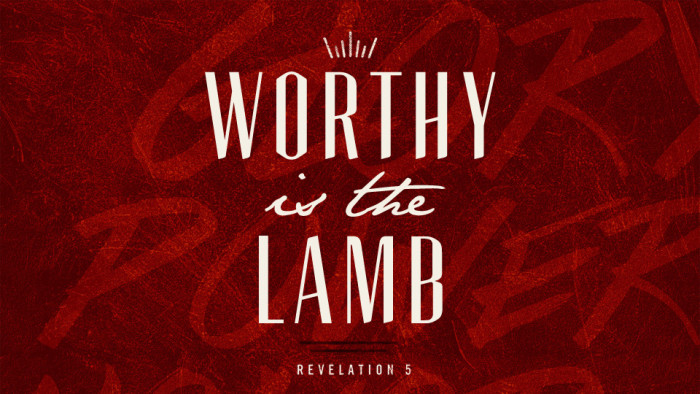 Who is worthy to open the scroll that contains God’s plan for the redemption and judgment of nations?
Who is worthy to open the scroll that contains God’s plan for the redemption and judgment of nations?
Revelation 5:1-4 says no ordinary power or person is worthy to open the scroll, but John’s weeping is about to change to worship for we see in 5:5-10 that “The Lamb is Worthy.”
THE LAMB IS WORTHY
The suspense and sorrow is broken for someone has been found for look at what happens in 5:5, “And one of the elders said to me, “Weep no more; behold, the Lion of the tribe of Judah, the Root of David, has conquered, so that he can open the scroll and its seven seals.” Notice the two identifications of this worthy figure. First, he is “the Lion of the tribe of Judah.” All the way back in Genesis 49 the patriarch Jacob prophesied that the ultimate ruler of God’s people would come from Judah and his lion-like character would lead him to triumph over his enemies. The second qualification is that he is also “the Root of David.” Various Old Testament prophecies said God’s the perpetual ruler of God’s people would come from David, who belonged to the tribe of Judah. But this conqueror isn’t merely common descendent of David, which would make him a branch of David, this victorious Lion is the root of David. Surely Judah’s fierce and fighting Lion can open the scroll!
But notice the stunning paradox in 5:6, “And between the throne and the four living creatures and among the elders I saw a Lamb standing, as though it had been slain.” Do you see the surprise? The conquering Lion is the slaughtered Lamb. It is the central paradox that God “achieved His triumph and delivered His people, not through the fireworks of military might, but through the weakness of crucifixion.” So too do we now fight our spiritual battles not with military might or political power, but with endurance, purity, and faithfulness to Christ, even to the point of death.
The Lamb stands in the center of heaven as one who had been slain, and the apocalyptic vision is a slain lamb “with seven horns and with seven eyes.” Horns in the Bible frequently symbolize strength and the rest of 5:6 tells us the seven eyes represent the fullness of the Holy Spirit. So this Lamb is no ordinary slaughtered sheep, for the seven horns and seven eyes symbolize the Lamb’s perfect power and knowledge. The Lamb is worthy!
What comes next is what W.A. Criswell called, “The most dramatic moment in all of redemptive history.” Look at 5:7, “And he went and took the scroll from the right hand of him who was seated on the throne.” No one in the entire universe was found worthy to take the scroll, in utter fear would any other person or being approach the throne of God, but with complete confidence the Lamb takes the scroll from the Father’s right hand. And the Father extends the scroll to Him, in effect saying, “It is time to bring my plan for the nations to fruition.”
Look now at 5:8, “And when he had taken the scroll, the four living creatures and the twenty-four elders fell down before the Lamb, each holding a harp, and golden bowls full of incense, which are the prayers of the saints.” Their new song of 5:9-10 begins,
“Worthy are you to take the scroll
and to open its seals,
for . . .
This song gives us three reasons for the Lamb’s worthiness to take the scroll of history and open its seals.
- His ransom is final. “For you were slain, and by your blood you ransomed people for God.” He was “slain.” He was slain once and for all, and His blood effectually ransomed people for God. He didn’t make salvation theoretical or merely possible, it was the final ransom and redemption for sinners like you and me.
- His ransom is universal. Jesus’ blood ransomed people “from every tribe and language and people and nation.” God’s plan to save the nations is accomplished through the work of Jesus on the cross.
- His ransom assembles. He “made them a kingdom and priests to our God, and they shall reign on the earth.” Jesus doesn’t just redeem His people, He assembles them into a kingdom of ruling priests. Which, importantly, was the original purpose of man in the Garden of Eden: to serve as priests and vice-rulers on the earth. He is worthy because He was slain, and His final, universal ransom assembles God’s people into His new covenant kingdom.
If you’re in here tonight and are not a Christian I pray you would understand the incredible news of the Lamb’s has accomplished. Should you remain in unbelief and sin Jesus’ opening of the scroll is most terrifying, for it means that God’s justice will eventually fall on you. But if you turn from your sin and trust in Jesus’ work of salvation Jesus’ taking of the scroll means God’s blessing and grace rain down on you in eternal life. And you can be among that number if you trust him as your Lamb, and submit to him as your Lion, and join the four living creatures and the twenty-four elders and the millions of angels to worship the King of kings with all your heart.
The Lamb alone is worthy to bring God’s purposes to pass and thus is ultimately “Worthy of Worship.”
WORTHY OF WORSHIP
I remember many years ago playing for our country’s national soccer team against Haiti in Ft. Lauderdale. The Haitian population is strong in the area and it felt as though we were playing an away game. Whenever the Haitians connected two or three passes together the crowd would erupt and you’d think they had scored a World Cup winning goal. It actually unnerved me a bit in the last 5-10 minutes of the first half and at half time the coach looked at me and simply said, “Get your composure back.”
Well, if several thousand loud voices were enough to overwhelm my heart, I can only imagine what happened to John in this vision. In 5:11 John hears “the voice of many angels, myriads of myriads and thousands of thousands,” which is something like a heavenly choir of over one hundred million crying out with a loud voice,
“Worthy is the Lamb who was slain,
to receive power and wealth and wisdom and might
and honor and glory and blessing!”
In a stunning turn of events, the same worship of the Father back in chapter four is now extended to Jesus. To Him belongs all “power and wealth and wisdom and might” and so He is due “honor and glory and blessing.” Who receives your highest honor? What receives your greatest glory? What power or majesty receives your strongest shouts of joy?
Notice how the worship of the Lamb is expanded outward, from the four livings creatures and elders, to the myriads of angels, and now in 5:13-14 the worship of Jesus extends to the whole universe, for notice what John says there, “13 And I heard every creature in heaven and on earth and under the earth and in the sea, and all that is in them, saying,
“To him who sits on the throne and to the Lamb
be blessing and honor and glory and might forever and ever!”
14 And the four living creatures said, “Amen!” and these elders fell down and worshiped.
He is the Lion who has conquered.
He is the Lamb who was slaughtered.
And so He is the Lord who reigns sovereign over history.
Let us behold the soul-thrilling glory of Christ.
SOUL-THRILLING IMPLICATIONS
Blaise Pascal once said, “Man’s sensitivity to little things and insensitivity to the greatest things are marks of a strange disorder.” Oh, how true that is especially in light of this text. We long for the praise of little men more than to praise the greatest God over the universe. We love pieces of green paper more than God. We love balls of pigskin more than His Son. Our first parents, Adam and Eve, showed us how prone we are to love fruit more than the Father. May God raise our small affections and little adoration tonight.
As we begin to close I simply want to meditate on four things implications for life from beholding this soul-thrilling glory of Christ.
Beholding this soul-thrilling glory of Christ leads us to . . .
Live fearlessly. This lamb-like lion, the elder says, “has conquered.” What is your greatest fear? The satanic Worm who seeks to destroy us? The sin that you feel powerless to conquer? The prospect of death? Revelation 5 reminds us those vaunted foes have lost and will lose, so we live fearlessly.
Preach zealously. He “has ransomed people for God from every tribe, tongue, nation, and language.” We declare the gospel zealously because it’s the power of God to save the nations. The salvation of the nations is the capstone of Christ’s worthiness, so we can share the gospel with confident zeal – for this is the reward of His suffering.
Pray earnestly. Remember what the elders held back in 5:8? “Golden bowls of incense, which are the prayers of the saints.” Not a single prayer for “His kingdom come” is ever lost. What encouragement we have here for our prayers, for this text is telling us that we are never nearer the throne of God than when we our soul bends in prayer. Live fearless, preach zealously, pray earnestly, and finally . . .
Love passionately. A glory-filled and soul-thrilled person is one who increasingly loves Jesus with peculiar passion.
I remember one time sitting in a large Presbyterian church in Dallas waiting for the service to start. Soon I heard a trumpet blast of voices singing “All Creatures of Our God and King”, but there was no choir on the stage and this was no recording. I eventually realized the choir was seated above me in the balcony and oh how the church couldn’t help but be taken up in praise to God.
The choir of angels sings above us now the glory song of Christ and let us join in as we behold the soul-thrilling glory of Christ.
This post is adapted from my recent sermon, “Worthy is the Lamb,” on Revelation 5.
Do You Hear What I Hear?
The Most Surprising Book of the Year
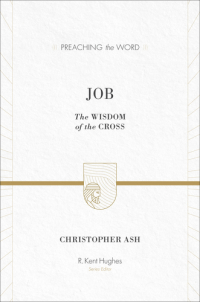 Last week I gave my “Favorite Books of 2014” knowing it didn’t include what may just have been the most surprising book of the year: Job: The Wisdom of the Cross by Christopher Ash.
Last week I gave my “Favorite Books of 2014” knowing it didn’t include what may just have been the most surprising book of the year: Job: The Wisdom of the Cross by Christopher Ash.
I say “surprising’ because who knew a commentary, on a canonical book many pastors never touch, would be so technically sound and pastorally sensitive. For my mind, Ash’s book is a model of how to write a commentary.
Here you will find Job’s harder parts treated with sound rigor and careful attention to the prevailing views of the time.
Here you will find sermonic outlines that are dangerously insightful. If you don’t have your own exegetical or homiletical outline before reading Ash, it will be hard not to just use his.
Here you will find a “Christ-centeredness” that is not predictable or forced. Rather, it is gloriously multifaceted. Ash continually lifts our gaze to all the wondrous ways Job is a foreshadowing of Christ’s person and work.
Here you will find heart-searching wisdom and application that makes this a wonderful devotional book. If you read it during daily devotions I bet you will find your soul growing pleasantly large.
Here you will find an exposition of Job that, if you have yet to do an expositional series on the innocent sufferer of old, will almost undoubtedly lead you to conclude, “Oh, how I need to preach through Job!”
An all-round outstanding, and surprising, achievement. Tolle lege!
New Member Letter
Every time a new member is formally received into membership at IDC the first thing we do is send the individual or family a “New Member Letter.”
It’s our way of saying, “Welcome!” and is also an avenue to exhort them in various things we want to be true about our church’s mission and life together. Things necessary for church unity. Here is the letter in its current form, maybe you can adapt it and use it for your church. Our letter is, after all, an adaptation of a similar one from Capitol Hill Baptist Church in D.C. Praise the Lord for like-minded partners in the gospel!
WHAT IT LOOKS LIKE
Dear New Member,
Welcome! On Saturday, August 10th the assembled congregation of Imago Dei Church affirmed you into membership. We are grateful the Lord as brought you into our local body.
As church members we are responsible to one another. Scripture uses metaphors of a building, a body, and a family to help us understand the corporate nature of our faith. As you commit yourself to the life of this church, keep in mind the following priorities.
Attend. Be constant in your attendance on Saturday nights. These gatherings are the primary means for you to get to know others and be known by them. Such participation will root you in the growth and development of our church.
Pray. Prayer for our services, witness, evangelism, and members, will strengthen the community of faith God is building at IDC. We suggest you pray through the church directory, praying through three or four names each day.
Give. Work toward contributing a percentage of your income regularly to the ministry of this church as we serve on another, our community, and the world.
Serve. Use your Spirit-given gifts to edify the body.
Live holy. Your actions, in private and in public, affect the health and witness of our church. Fight sin by God’s grace and, through the Spirit’s work, grow in the grace and knowledge of Christ.
Evangelize. You’re a missionary sent by our church into your neighborhood, home, and workplace. Grow in your understanding and affection for the Gospel, and pray daily to seize opportunities to share the good news.
Set aside the second Saturday night of every other month to be at our family meetings. These meetings occur regularly every other month; the next meeting happens on August 10th. Whether the meetings are long or short, exciting or routine, they are a crucial part of our functioning as a congregation.
As we come together and pray, as we give and obey, as we deliberate and decide, we have the opportunity and responsibility to show God’s glory to this neighborhood, this city and beyond. Welcome to the challenge and privilege of being a member of Imago Dei Church.
Strangely Precious Indeed
Why It Matters
After hearing a series of unimaginable promises about her soon-to-be-conceived son, Mary asks Gabriel that obvious question in Luke 1:34, “How will this be, since I am a virgin?” To Mary, the possibility of bearing a child is unimaginable.
Notice how Gabriel responds in 1:35, “And the angel answered her, “The Holy Spirit will come upon you, and the power of the Most High will overshadow you; therefore the child to be born will be called holy—the Son of God.” This verse is like a masterpiece of art in the museum of God’s truth, it deserves our deep gaze and rapt attention. Everything about our faith hangs on this truth.
WHY THE VIRGIN BIRTH MATTERS
How can a virgin bear a child? How can a human baby be a divine king? Answer according to Gabriel, “The Holy Spirit will come upon you, and the power of the Most High will overshadow you.” The word for “overshadow” appears in the Old Testament when God hovers over the tabernacle, and then again at the Transfiguration when God “overshadows” the mountain. The Father will “overshadow” by the Spirit coming “upon” Mary.
And did you see the sovereign result of this sovereign working of God in 1:35, “therefore the child to be born will be called holy—the Son of God.” Do you see it? The divine sonship of Jesus depends on the virgin birth by the Spirit. This is why we can never say, as many people have throughout the centuries, that the virgin birth is a meaningless myth. If we lose it, Gabriel says we lose the divinity of Jesus. And if that happens we lose salvation.
To further cement certainty in Mary’s mind notice what Gabriel says next in 1:36-37, “And behold, your relative Elizabeth in her old age has also conceived a son, and this is the sixth month with her who was called barren. For nothing will be impossible with God.” Elizabeth, who carries John the Baptist in her belly, was old and barren. It was humanly impossible for Elizabeth to conceive, yet she has. And Mary will can trust in Gabriel’s word, “For nothing will be impossible with God.” Our God is Lord of the impossible and unimaginable; the virgin birth is our perfect proof. Do you know a God who can do impossible things? Who performs wonder that science says are impossible? That logic says can’t come to pass? Or do you have a God who can only do what man’s knowledge says is possible to do?
REJOICE IN HUMILITY
Let’s see how Mary responds to the unimaginable promises of Gabriel in 1:38, “And Mary said, “Behold, I am the servant of the Lord; let it be to me according to your word.” And the angel departed from her.” Oh may our response to God’s surprising promises and power be like Mary’s, may He help us rejoice in humility. What’s your ordinary stance before God’s word? Is it one of prideful questioning? Fearful doubt? Or joyful humility?
When we see the baby king, let us rejoice! Rejoice from grace, for power, and in humility. Rejoice in the unimaginable birth of Jesus.
IN WONDER AND WORSHIP
Two weeks ago we celebrated Owen’s three-year-old birthday and one of my sisters got him some twelve inch long Avengers action figures. The joy of childhood delight is a wondrous thing to behold. Owen has never seen an Avengers movie or cartoon, but he does have Avengers pajamas and t-shirts and has watched two collective minutes of Avengers action on YouTube. But my how he loves Hulk, Captain American, Thor, and Iron Man. Well he opens up these actions figures at his birthday party and his face was the portrait of childlike wonder. Never before had he conceived of possessing these figures of power and courage.
The correlation to our souls stance towards Christ became so clear to me in that moment. When we come to the birth of Christ we come to the greatest gift of God; a savior born to die for sinners. Let me mention two things in closing that I long to be true of us as we come to the virgin birth.
Come in wonder. Oh how I long for Christ to captivate my attention – our attention. Captivation depends on wonderment. There is wonder aplenty in our text. As Thomas Watson says, “[Christ] was born of a virgin, that we might be born of God. He took our flesh, that He might give us His Spirit. He lay in the manger that we might lie in paradise. He came down from heaven, that He might bring us to heaven. And what was all this but love? If our hearts be not rocks, this love of Christ should affect us. Behold love that surpasses knowledge (Eph. 3:19)!”1 What brings your soul delightful wonder? May the glory of Christ increasingly captivate you in wonder.
Come to worship. For most of us, one month or so of every year is spent walking on a road marked “Christmas: The King Has Come” and may we always follow it to the intended destination: worship. Come in wonder and come to worship. With newfound meaning and delight let us rejoice in the unimaginable birth of Jesus.
This post is adapted from my recent sermon, “The Baby King,” on Luke 1:26-38.
- Thomas Watson, A Body of Divinity, 196. ↩
A Banner Year
2014 is almost over and reasons to praise God for His kindness are everywhere. One reason is the Christian publishing industry.Particularly Reformation Heritage Books and Banner of Truth.
In the final months of this year each publishing house has achieved something rather remarkable: the reprinting of works from two legendary figures in church history, John Knox and William Perkins.
THE TRUMPET OF THE SCOTTISH REFORMATION
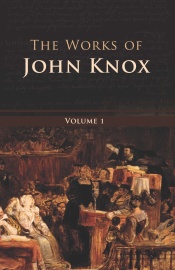 Banner of Truth says, “Unfortunately for many years hardback sets of Knox’s Works have been virtually unobtainable by, and inaccessible to, the general public. Now, to mark the 500th anniversary of his birth (probably in 1514) and the 150th anniversary of the completion of the first definitive edition of the Scottish reformer’s Works (1846-64), these rare volumes have been reprinted. The present republication of the reformer’s writings provides a unique and remarkably affordable opportunity for a new generation of students to rediscover and get to know the real John Knox.”
Banner of Truth says, “Unfortunately for many years hardback sets of Knox’s Works have been virtually unobtainable by, and inaccessible to, the general public. Now, to mark the 500th anniversary of his birth (probably in 1514) and the 150th anniversary of the completion of the first definitive edition of the Scottish reformer’s Works (1846-64), these rare volumes have been reprinted. The present republication of the reformer’s writings provides a unique and remarkably affordable opportunity for a new generation of students to rediscover and get to know the real John Knox.”
Click here to see the table of contents for all six volumes.
THE FATHER OF THE PURITANISM
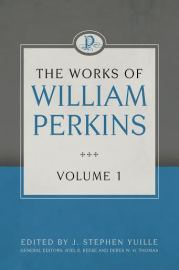 Though Perkins is best known today for his writings on predestination, he also wrote prolifically on many subjects. His works filled over two thousand large pages of small print in three folio volumes and were reprinted several times in the decades after his death. However, his complete works have not been in print since the mid-seventeenth century.
Though Perkins is best known today for his writings on predestination, he also wrote prolifically on many subjects. His works filled over two thousand large pages of small print in three folio volumes and were reprinted several times in the decades after his death. However, his complete works have not been in print since the mid-seventeenth century.
Reformation Heritage has blessed the church and academy with a modern typeset edition of the Works includes four volumes of Perkins’s expositions of Scripture, three volumes of his doctrinal and polemical treatises, and three volumes of his practical writings.
The present volume contains three of Perkins’s treatises. The first is A Digest or Harmony of the Books of the Old and New Testament, which offers a synopsis of the Bible that relates sacred history to the chronology of the world. Dating God’s creation of the universe in 3967 BC, Perkins develops his overview of redemptive history that culminates in the final judgment.
The second treatise is The Combat between Christ and the Devil Displayed. Expounding Matthew 4:1–11, Perkins shows how Christ’s temptation in the wilderness (1) set Jesus up to serve as the second Adam, overcoming Satan’s temptation in a way the first Adam did not; (2) reveals how the devil assaults the church so that we might be better prepared to resist his temptations; and (3) equipped Christ to be a sympathetic high priest to those who are tempted.
The third and most significant treatise is A Godly and Learned Exposition upon Christ’s Sermon in the Mount. “Hereof I have chosen to entreat,” says Perkins, “because it is a most divine and learned sermon, and may not unfitly be called the ‘Key to the whole Bible’; for here Christ opens the sum of the Old and New Testaments.” The fact that Perkins saw the Sermon on the Mount as unlocking the meaning of Scripture in its entirety suggests that his understanding of what Christ declares in Matthew 5–7 was pivotal to the development of his theology and piety.
The Hymn of The Season
There are few things in this world that stir my soul like the nostalgic power of Christmas hymns and carols. In my estimation, the king of all carols is Charles Wesley’s “Come Thou Long Expected Jesus.”
It was first published in 1744 in Charles Wesley’s Hymns for the Nativity of Our Lord, a little collection so popular that it was reprinted 20 times during Wesley’s lifetime. Some people think it may have been the first hymn Wesley wrote. If so, his first at-bat was an out-of-the-park grand slam. “Come Thou Long Expected Jesus” is a perfect portrayal of how to rightly communicate truth in a song. Every line is dripping with profound and searching theology. The phrases are carefully order to exalt Christ.
In short, our churches need this hymn. Let’s give it to ’em with delight each year. Here are three different arrangements for you to consider, from the traditional to the creative.
LYRICS
Come thou long expected Jesus
Born to set thy people free
From our fears and sins release us
Let us find our rest in thee
Israel’s strength and consolation
Hope of all the earth thou art
Dear desire of every nation
Joy of every longing heart
Born thy people to deliver
Born a child and yet a king
Born to reign forever
Now thy gracious kingdom bring
By thine own eternal spirit
Rule in all our hearts alone
By thine all sufficient merit
Raise us to thy glorious throne

